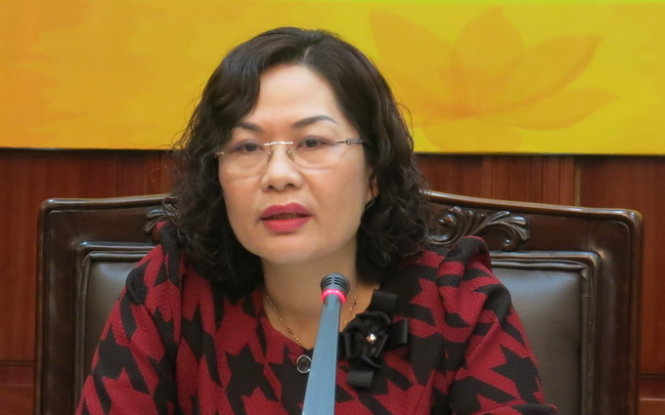The swift move of Vietnam’s central bank on Wednesday in response to the devaluation of the Chinese yuan will fortify the local banking and financial system so that it will stand firmly against any external destabilizing factors, according to a senior official of the State Bank of Vietnam (SBV).
>> An audio version of the story is available here
The move by the SBV, which is the central bank, allows the local currency, the Vietnamese dong, to be traded more flexibly within a widened trading band to cope with China’s depreciation of its currency against the U.S. dollar and is aimed at ensuring the competitiveness of Vietnamese goods.
Beijing devalued the yuan by 4.6 percent between Tuesday and Thursday, sending shock waves across the globe and triggering many countries to depreciate their currencies against the greenback, in a bid to encourage exports in order to speed up its slowing economic growth.
The SBV gave the green light on Wednesday for the trading band for interbank dollar/dong transactions to move from one percent to two percent after China’s central bank depreciated the yuan by 1.9 percent against the dollar one day before.
New trading band
The SBV’s move paved the way for dollar/dong transactions to fluctuate within a band of plus or minus two percent around the midpoint, which the central bank sets daily.
The midpoint has been held at 21,673 dong per dollar since May 7, when the SBV devalued the local currency by one percent for the second time this year, aiming to spur exports and curb demand for imports that have left it with a hefty trade deficit, according to Reuters.
The new trading band allows a range from VND21,240 to VND22,106 to the greenback.
The expansion of the trading band for interbank dollar/dong transactions will help the local banking system be more proactive and flexible in maneuvering foreign exchange rates prior to the adverse impact on the international market, Nguyen Thi Hong, deputy governor of the SBV, told Tuoi Tre (Youth) newspaper in an interview on Wednesday.
Since early this year, there have been many developments beyond the forecasts of both international and domestic financial and economic organizations, she said.
Those developments included a drop in the price of oil to its lowest level in many years, the high possibility of an interest rate hike of the U.S. Federal Reserve (FED), as well as the deterioration of the European economy triggered by the economic crisis in Greece, Hong added.
All of those factors have given the U.S. dollar a chance to rise at a much higher rate in value than the rate the FED had expected, she said.
Right at the beginning of the year, Vietnam’s central bank expected to be challenged by the extraordinary changes that would adversely affect the local foreign exchange rate and exports, so it has actively devalued the dong by two percent, Hong added.
Therefore, the foreign exchange market and exchange rate have remained basically stable over the past seven months.
However, the yuan fell sharply recently, igniting the depreciation of a series of key Asian currencies, as well as a decline in the price indices on the international commodity markets, which can be considered as new external shocks for Vietnam.
China and other Asian countries are the main trade partners of Vietnam, and the Southeast Asian country is running a big trade deficit with its northern neighbor, so the devaluation of their currencies will adversely affect the exchange rates and exports of Vietnam, Hong asserted.
Therefore, the SBV decided to widen the exchange rate’s trading band by one percent to make the local economy fit in the new situation, she added.
Regarding the question of why the central bank chose to do this rather than officially devalue the dong, Hong said expanding the trading band is more appropriate for Vietnam, as a more flexible band helps maintain macroeconomic stability and better copes with the risks and uncertainties of international markets.
When asked what the SBV will do to stabilize the exchange rate and the foreign exchange market in the coming time, Hong said the central bank will closely monitor both national and international market developments to synchronously take many measures and use policy tools to stabilize the Vietnamese banking and financial system.
Under control
Truong Van Phuoc, vice chairman of the National Financial Supervisory Commission, told Tuoi Tre that the exchange rate mechanism of Vietnam is called a regulated management mechanism.
Accordingly, the central bank announces the daily rate and the average interbank rate, which local banks will adopt by applying the trading band to sell or buy on the foreign exchange market.
One can see that the Chinese yuan has surged by about 30 percent in 2005, Phuoc said.
Meanwhile, the Vietnamese dong has dropped by 40 percent, from around VND15,500 per dollar to VND22,000 per dollar, he elaborated, adding that excluding inflation, the exchange rate advantage of the dong is still bigger than the yuan by about 70 percent.
According to Dr. Nguyen Duc Thanh, director of the Vietnam Institute for Economic and Policy Research, under the University of Economics and Business, the SBV’s move to loosen the trading band can be seen as an effective way to devalue the dong without really doing so.
With this mechanism, the central bank did not change the core rate, VND21,673 to the dollar, to keep its word on not devaluing the dong by over two percent this year, he told Tuoi Tre.
But in fact, with the loosened trading band, the market will quickly take the exchange rate toward the other allotted end of the band, Thanh said.
This is the administrative procedure, which is not really important; the more important thing is that the central bank has responded swiftly and positively, he added.
Like us on Facebook or follow us on Twitter to get the latest news about Vietnam!



















































